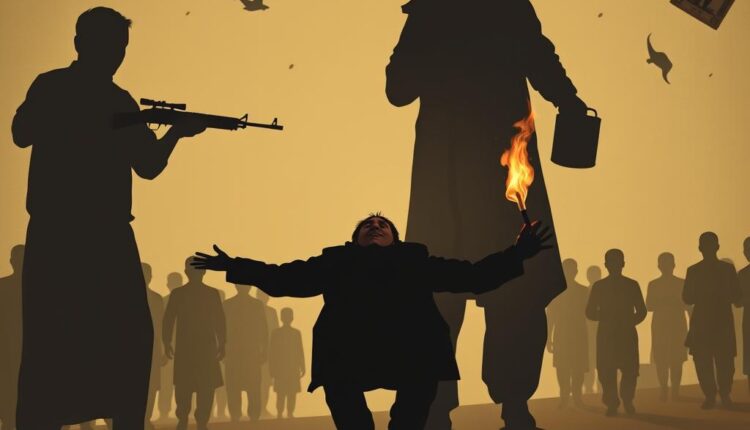Justice Delayed, Not Buried: Bandipora Court Convicts Hizb Terrorist in 1993 Murder
Convict Abdul Wahid Mir sentenced to life; LG vows reopening of buried terror victim cases
Sheikh Saleem
Bandipora, Aug 20: In a landmark judgment that brings closure to a family silenced for more than three decades, a local court in Bandipora on Tuesday sentenced Hizbul Mujahideen terrorist Abdul Wahid Mir to life imprisonment for the 1993 murder of a 32‑year‑old civilian, carpet weaver Mohammad Shafi Hajam of Onagam village.
Judge Susheel Singh of the Court of Additional Sessions Bandipora held Mir guilty of murder under Section 302 RPC, sentencing him to life imprisonment, three years rigorous imprisonment under Section 201 RPC, and seven years rigorous imprisonment under Section 7/27 Arms Act. All punishments will run concurrently. The convict, currently lodged in Central Jail Agra, will serve his term there subject to confirmation of the judgment by the High Court of Jammu and Kashmir and Ladakh.
According to eyewitness testimony, on the morning of December 7, 1993, Mir, along with another terrorist, Ali Mohammad Khawja alias Khan, entered Shafi’s home, demanded his scooter, and forced him to accompany them. “First he rode the scooter and then shot my brother in the forehead, the bullet exited from the back of his head. We saw it from a distance of 8 feet,” one brother testified in court. Eyewitnesses added that Mir then tried to set the body on fire with kerosene until villagers intervened. Terrified of reprisal, the villagers and family were left powerless. “They made announcements warning anyone providing food or other assistance to the deceased’s mourning family would face the same fate,” witnesses recalled.
The brutality left the Hajam family living in fear for forty days, unable even to mourn. Posters appeared branding Shafi as an “informer.” Out of fear and silence, the family saw the case closed within months as “not traced” in March 1994. A full eleven years later, in 2004, they gathered courage and approached police again, naming Mir and Khawja as the killers. The case was reopened, and fresh witness statements—including from Shafi’s father, brothers and nephew—were recorded consistently and truthfully, ensuring the case was carried forward.
After years of trial, the court finally recorded Mir’s guilt. In his order, Judge Singh described the murder as “heinous and one that shook the conscience of society.” At the same time, he cited mitigating factors such as Mir’s present age of 55 and prolonged incarceration as reasons for not awarding the death penalty.
The co‑accused, Khawja represented by Advocate Shuaib Deewani was acquitted. The court observed that the prosecution had failed to establish any role by him beyond doubt. “The evidence on record does not establish motive, prior meeting of minds, or any overt or covert act. None of the eye‑witnesses nor the Investigating Officer could directly implicate the second accused,” the court noted.
The court further directed the release of ₹1 lakh compensation to Shafi’s parents under the 2013 Victim Compensation Scheme. Appreciating the assistance rendered by the Additional Public Prosecutor and Legal Aid Defence Counsel, Judge Singh remarked that without their support, conclusion of the matter would not have been possible.
The verdict also comes against the backdrop of recent instructions by Jammu and Kashmir Lieutenant Governor Manoj Sinha, who directed Deputy Commissioners and SSPs to reopen cases that were deliberately buried, to register FIRs afresh and provide jobs to the next of kin of all terror victims. He further announced that a Special Cell would be established in the LG Secretariat to address concerns of terror‑victim families and directed authorities to take immediate steps to restore properties and land grabbed by militants and their sympathisers.
For the Hajam family, the long road has at last reached its destination. Justice has arrived after 32 years of silence, threats, and perseverance. A man once maligned as an informer now stands vindicated as an innocent victim of terror, and his family can speak his name without fear. In the forgotten lanes of Onagam, Tuesday’s conviction is more than punishment for one man; it is proof that even in Kashmir’s darkest cases, justice delayed is not justice buried.
Timeline of Bandipora Civilian Murder Case
Dec 7, 1993— Hizbul terrorists Abdul Wahid Mir & Ali Mohammad Khawja take away 32-year-old carpet weaver Mohammad Shafi Hajam from his home in Onagam, Bandipora; Hajam is shot dead at point-blank range.
Dec 1993–Mar 1994— Initial investigation fails; case closed as “not traced.”
2004— Victim’s family, after overcoming fear, reopens case; names Abdul Wahid Mir & Ali Mohammad Khawja as accused. Fresh witness statements recorded.
2004 onwards— Charge sheet filed; Mir admits past militancy, claims to have surrendered. Khawja remains absconding; proceedings under Sec 512 CrPC initiated.
2004–2024— Trial continues; multiple eyewitnesses (family & villagers) depose against Mir.
Aug 20, 2025— Additional Sessions Judge Bandipora, Susheel Singh convicts Abdul Wahid Mir under Sections 302, 201 RPC & 7/27 Arms Act; sentences him to life imprisonment (sentences to run concurrently).
Aug 20, 2025— Court acquits co-accused Ali Mohammad Khawja, citing lack of reliable evidence.


Comments are closed.